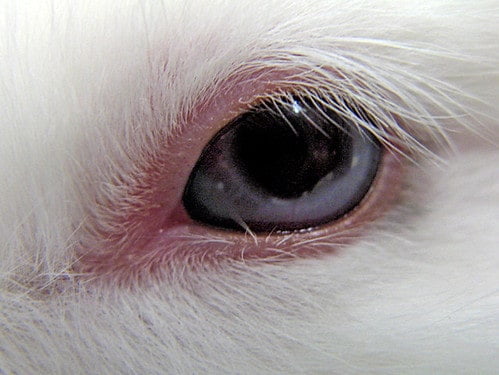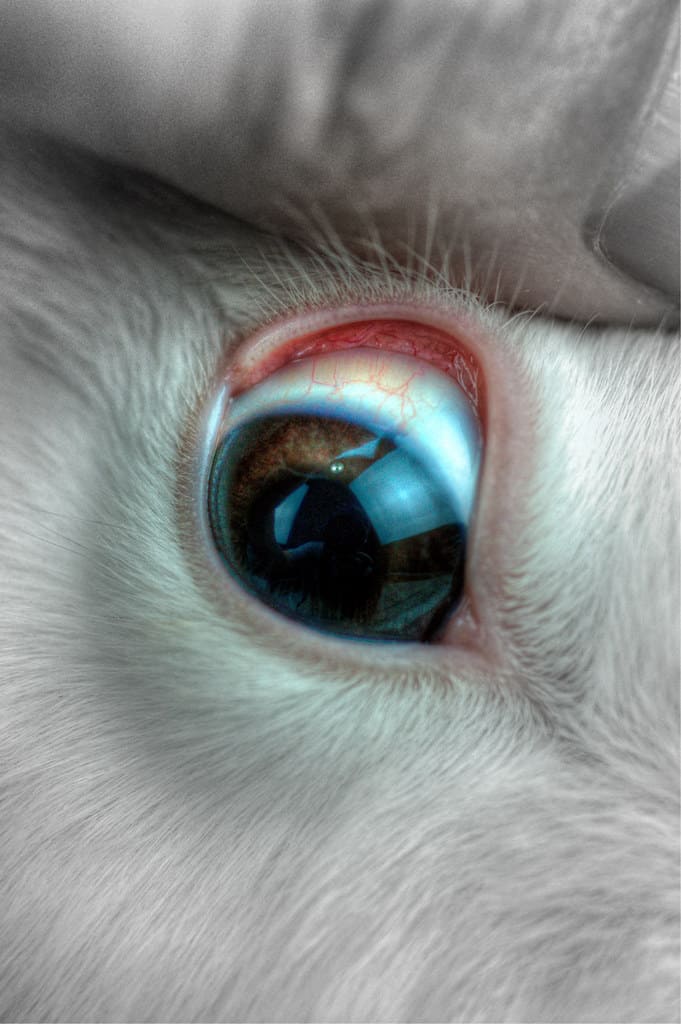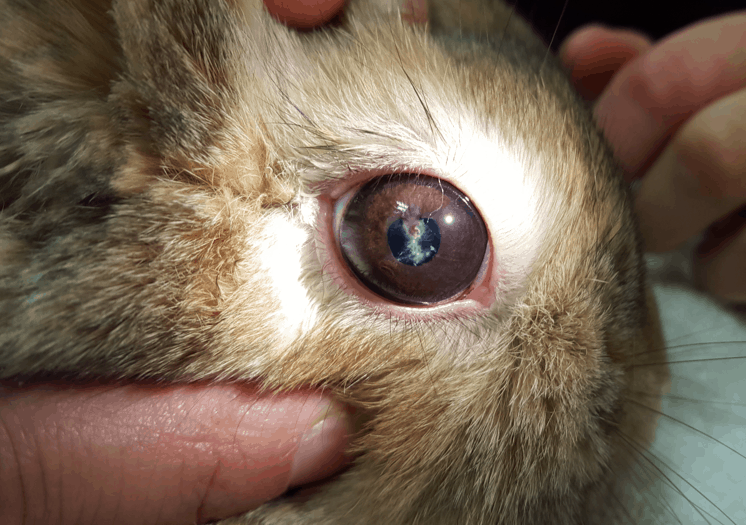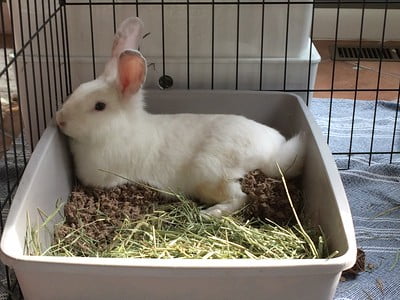Last Updated on March 11, 2023 by Marjon Ramos
You can tell if your rabbit is blind or semi-blind by looking at signs like regularly bumping on things, sensitivity to sounds, eyes not responding to light, going in the wrong directions when called, and physical changes or deformities in or around the eyes.
While the most common causes of blindness are cataracts, E. cuniculi, scratched eyes leading to corneal ulcers, or old age.
Now that I’ve given you the gist of the article, read on as I explain in more detail how you can tell if your rabbit is blind:
Table of Contents
Signs that your rabbit is blind

Rabbits have excellent senses that can compensate if they are having vision problems. This makes it hard to detect if something is wrong with their vision.
With blindness, it may be hard to detect when you don’t know what you’re looking for. So here are the most common signs that something is wrong with your rabbit’s vision:
1. Your rabbit regularly bumps into things when running.
Rabbits without vision problems are excellent navigators and will rarely bump into things, even if they’re running at full speed.
The opposite is true for rabbits with vision problems. Are you noticing that your rabbit is suddenly clumsy? Do they look confused when hopping around? Do they suddenly stop when near a wall or an object?
If you notice sudden behavioral changes like the ones I mentioned above, get your rabbits checked by a rabbit-savvy veterinarian for vision problems.
2. Your rabbit goes in the wrong direction when being called.
A rabbit that’s having vision problems would suddenly get confused about the direction the sound is coming from. This is due to the fact that the sudden loss of vision is affecting your rabbit’s other senses, making them compensate for the lost vision.
But over time, rabbits actually adapt remarkably well even without vision.
3. Your rabbit’s eye doesn’t respond to light.
If you want to test if your rabbit is having vision problems, try shining a light on it. A normal pupil would react to light almost immediately.
You could also look for cataracts. Look for any discolorations or physical deformities in your rabbit’s eye.
4. Unusually sensitive to normal sounds.
Although rabbits are easily startled by loud sounds, it can be a sign of vision problems if your rabbit is sensitive to sounds they otherwise wouldn’t.
A great example is when you’re walking to get your rabbit. Does it get startled even though your rabbit is looking in your direction? If so, check for physical signs like:
5. Physical changes or deformities in the eyes.
Physical signs or changes in your rabbit’s eye are the best ways to diagnose vision problems.
If you notice any of these symptoms, call a veterinarian to get your rabbit’s eyes checked:
- Redness and swelling around the eye.
- Cloudy or white appearance in one or both eyes.
- Swelling or receding eyeball.
- Dilated pupil
- Wound or scratch in the eyeball.
Common causes of blindness in rabbits

Now that we know what to look for if we suspect that our rabbit might be having vision problems, here are the most common reasons why rabbits go blind:
1. Cataracs
You can tell that your rabbits have cataracts if they have a milky or cloudy film in the lens of their eyes. It could be from one or both eyes.
Most of the time, rabbits develop cataracts due to old age. But it could also be due to their diet, trauma, and e. cuniculi.
2. E. cuniculi

E. cuniculi, a parasite that infects the eyes and nervous system, is one of the major causes of blindness in rabbits. Within a month of exposure, E. cuniculi can infect the rabbit’s eyes and brain.
E. cuniculus is a serious condition that should be looked at by a veterinarian. With enough time, your rabbit’s eye could develop cataracts, severe inflammation, redness, and swelling of the eye.
If your rabbit is not treated immediately, it could lead to permanent blindness and even death.
3. Scratched eye
Scratched eyes are usually caused by irritation due to foreign bodies like mange and mites. It could also be caused by bedding and hay getting stuck in the rabbit’s eye, causing irritation.
If not treated, a scratched eye can cause painful corneal ulcers, which could lead to blindness if not treated.
Make sure that your rabbit’s bedding is not dusty and that their bedding is always clean. If you notice redness around your rabbit’s eye or missing fur caused by mange, get your rabbit checked out immediately.
4. Age
Old age could also be the cause of blindness in rabbits. Like us, rabbits’ eyesight deteriorates as they age. The most common cause of blindness in old rabbits is cataracts.
Summary
Here are the most common signs that your rabbit might be blind or have vision problems:
- Clumsiness or regularly bumping into things when running
- Going in the wrong direction when being called
- Pupil not responding to light
- Unusually sensitive to otherwise normal sounds.
- Any physical changes in or around the eye, like inflammation.
If you notice any of these in your rabbits, immediately call a veterinarian. Your rabbit might be suffering from dangerous conditions that could lead to permanent blindness or even death.
Cite this article:
Sources and further reading
- Buseth, Marit Emilie., and Richard A. Saunders. Rabbit Behaviour, Health, and Care. CABI, 2014.
- Lebas, F. The Rabbit: Husbandry, Health, and Production. Food and Agriculture Organization of the United Nations, 1997.
- Patry, Karen, et al. The Rabbit-Raising Problem Solver: Your Questions Answered about Housing, Feeding, Behavior, Health Care, Breeding, and Kindling. Storey Publishing, 2014.
- Corneal abrasion and ulceration in rabbits
- E. cuniculi
- Cloudy Eye in Rabbits




